 I. INTRODUCTION
I. INTRODUCTION
ABA member bank representatives – as well as ABA Deputy Secretary Mr. Amador Honrado Jr. – joined other delegates from private and public sector organizations at the 57th Annual Meeting of the Asian Development Bank (ADB) held for the first time in Tbilisi, Georgia on May 2-5, 2024.
Held under the theme “Bridge to the Future”, the four-day event brought together finance ministers, central bank governors, senior government officials, and representatives from the private sector, academia, media, and civil society from ADB’s 68 members. The participants examined key development issues facing Asia and the Pacific including climate change, artificial intelligence, and green globalization.
The meeting also showcased the growing partnership between Georgia and ADB and emphasized Georgia’s commitment to regional development and cooperation. ADB Managing Director General Woochong Um said: “Tbilisi’s location at a crossroads between east and west presents an excellent opportunity to explore the physical, financial, and economic connections between Asia and Europe.”
During the past several years, the ADB has accredited the ABA as a Guest Association in the Annual Meetings of its Board of Governors. The Annual Meeting is te year’s largest gathering of the organization an annual opportunity for ADB Governors to engage in focused discussion on development issues and challenges facing Asia and the Pacific.
II. MEETING HIGHLIGHTS
(1) Opening Session
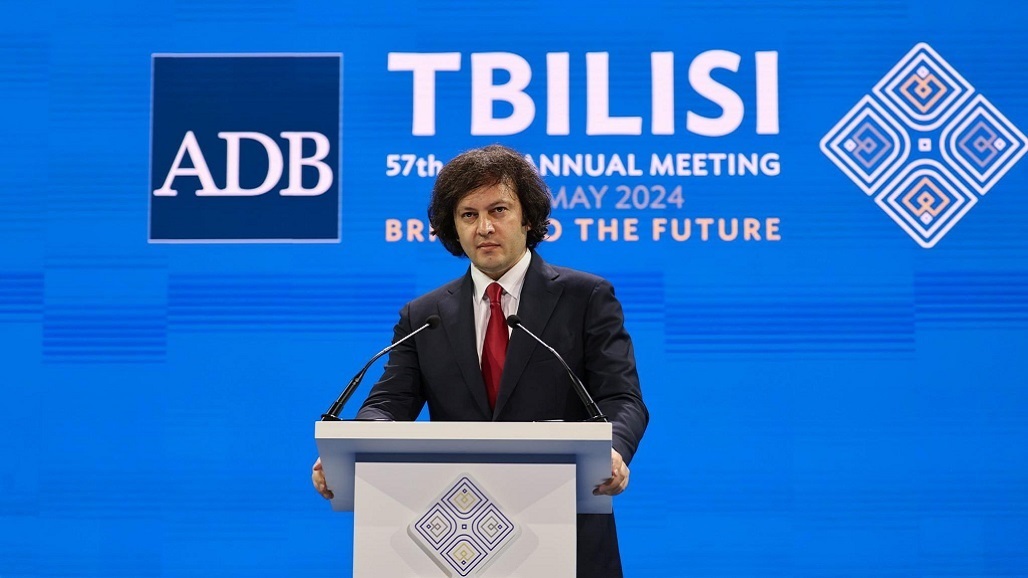
In his Address at the Annual Meeting’s Opening Session (which was graced by the presence of Georgia’s Prime Minister H. E. Irakli Kobakhidze on May 4, ADB President Masatsugu Asakawa pointed out that: “We come together at a time when the people of our region face challenges that demand our close attention and coordination. The impacts of climate change are unrelenting, and the risks from conflict and crisis can quickly undermine their livelihoods, and even their survival. My friends, this is why development cannot stand still. It requires us to evolve to face the realities in front of us, and prepare for the challenges on the horizon. These meetings invite us to reflect deeply on this call to action. How can we work together to build a bridge to the future?”
Mr. Asakawa proceeded to take a few moments to share some of his thoughts about how we can answer this call, as follows:
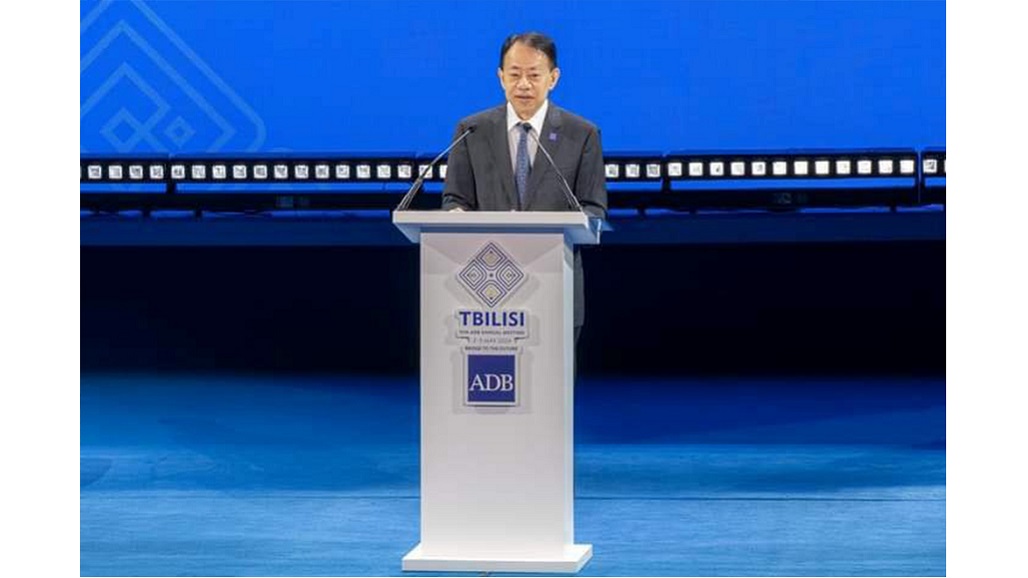
Building resilience to heat stress
“Let me begin with the threat of climate change. This threat cannot be ignored, and our response cannot be delayed.
“2023 was the hottest year on record. We see its effects on people and risks to future development. Crops and food systems are increasingly vulnerable. Melting glaciers are causing tremendous devastation downstream. And workers, from the fields to factories, especially women, are suffering tremendously from heat stress.
“This is a grave threat along many dimensions — from food security; to infrastructure; to water resources; to health, employment, and equality. And so, the future depends on how we support people, sectors, and ecosystems affected by heat.
Harnessing AI for inclusive growth
“Let me turn now to another priority for the future: the need to harness digital technology and ensure its careful and equitable use.
“Artificial Intelligence offers tremendous potential to drive growth and help address development challenges in areas like healthcare, agriculture, and climate change. But, developing countries will miss out if they are not able to adopt this technology. There are also risks from AI, such as bias and lack of transparency.
“ADB is working hard to strengthen the capacity of our developing member countries to deploy responsible AI solutions that follow an ethical framework and drive inclusive growth. We believe that bridging the digital divide, and opening opportunities from AI, are key to a more prosperous future.
Driving green globalization
“Next, let me reflect on globalization. Our presence in this room demonstrates how deeply our world is connected. We should celebrate this. We should also develop these connections to build greener and more open economies.
“It might be easy to look back at the pandemic, or at current geopolitical tensions and conflicts, and conclude that globalization is dead. I do not believe it.
“It is true that global trade and supply chains are vulnerable to shocks. But the answer cannot be protectionism and segmentation. Free trade and free movement of capital have benefited our region for decades, and this must be the way forward.
“So, let us explore how to deepen regional cooperation, in order to build resilience in supply chains, promote cross-border trade, bolster private sector investment, and strengthen financial and tax cooperation.
“Let’s also find ways to decarbonize global supply chains. Trade-related activities account for up to 30% of the world’s carbon emissions. The uncomfortable truth is that with Asia’s strong growth, our contribution to greenhouse gas emissions is rising.
“Now is the time to act to reduce global value chain-related emissions for a more sustainable future.
Supporting our members with the greatest need
“Last, let me stress that our bridge to the future cannot leave behind those with the greatest need.
“The poorest and most vulnerable populations, including those in small island developing states, face the heaviest burdens from climate change, economic shocks, and conflict.
“Our financing must continue to include resources on concessional terms, including grants. The Asian Development Fund has been a crucial vehicle for this. And with a replenishment completed on Thursday, we will be able to deliver up to $5 billion to meet these needs.
“I am thankful to our donors for this support. It makes a difference. I know this because I have met people across the region who face better prospects because of our investments in their future.
“My friends, our bridge to the future must be one that is inclusive in this way. No one should be denied the benefits of development because of barriers to obtaining financing.”

(2) Seminar Sessions
A number of concurrent seminars were held during the course of the four-day event. These included the following:
Harvesting Hope: Ensuring a Food Secure, Climate Resilient Asia and the Pacific
The panelists noted that through heat and water stress, climate change is impacting global food systems and that, inversely, food systems are responsible for about a third of greenhouse gas emissions. They also pointed out that more than half of the people affected by hunger globally are in Asia. The session further discussed ways in which development partners can respond to the challenge of climate change and food security in the Asia and Pacific region.
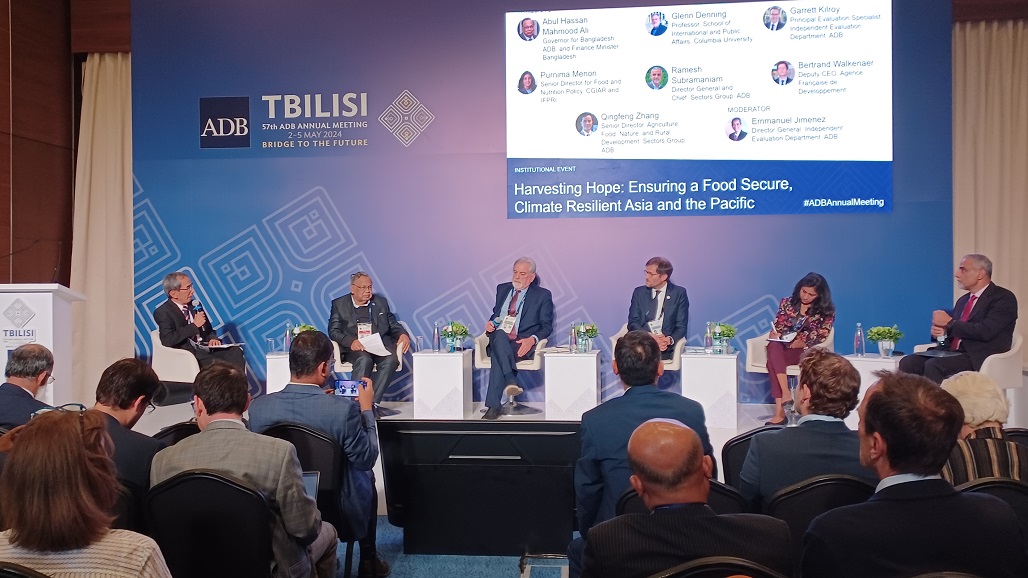
This session delved into Georgia’s pivotal role in connectivity, focusing on European connectivity and the Middle Corridor. It also explored the Middle Corridor’s potential to drive economic growth and regional integration by revitalizing historic trade routes and offering strategic alternatives for trade between Europe and Asia.
Collaborative Fintech Community: Building on the Middle Corridor Momentum
The seminar discussed creating a regional fintech hub in the Middle Corridor countries, focusing on why, who, what, and how. Speakers agreed that Georgia’s open fintech strategy, legal alignment with the EU, tech talent, growing e-commerce, and appeal to digital nomads position it for success, and noted that middle corridor and fintech could drive development of regional financial infrastructure.
Sustainability in Finance – Role of ESG in Capital Markets
The seminar discussed the rise of environmental, social, and corporate governance (ESG)-themed capital markets as a key mechanism for directing climate finance to sustainable projects, focusing on the development of ESG bond markets in Georgia and other developing countries. Discussions covered the journey of ESG markets from pioneering in developed economies to their expansion in Asia and the Pacific.
Next Generation Digital Infrastructure: Powering AI and Digital Transformation
The speakers noted that as the world transitions to an increasingly digitalized economy, data centers play a pivotal role in meeting the infrastructure needs of this transition, and that data centers provide the computing power necessary to process complex algorithms, run applications, and analyze large datasets in real-time. The session discussed data centers’ place in the deployment of AI-driven technologies, and their significant economic impact on a country’s digital transformation.
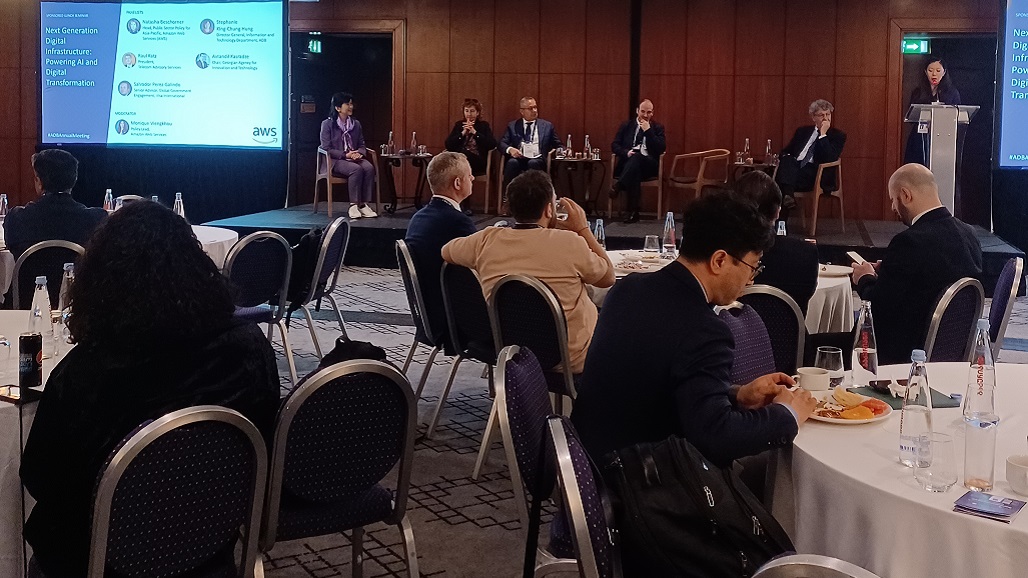
This session addressed frontier market integration into the global financial system, focusing on local currency market development. Panelists discussed strategies to enhance regional financial infrastructure. The first part of the session covered ministerial insights on fostering robust local markets and the role of international financing institutions in diversifying funding sources. The second part of the session analyzed investment potential and opportunities, considering the high-yield environment in advanced economies.
Launch of Asian Development Policy Report 2024: Aging Well in Asia
The inaugural ADB report – which was discussed in this launch seminar – notes that developing Asia is aging rapidly and the region needs to prepare for this demographic change. IT explores key dimensions of well-being at old age, including health, employment and retirement, economic security, and social engagement.
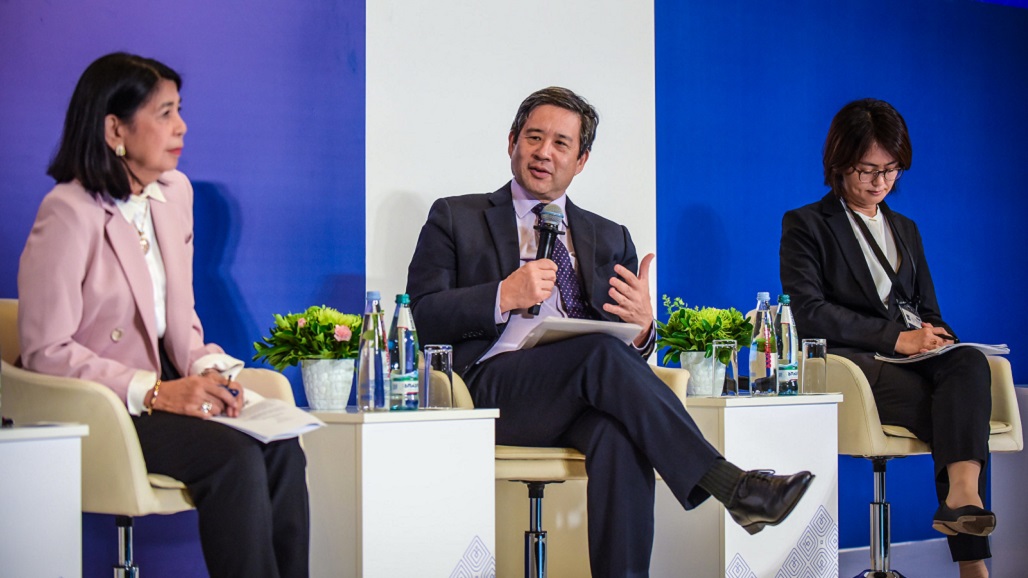
Unlocking Private Sector Participation and Financing Climate Finance Projects in ADB’s DMCs
The seminar focusED on increasing private sector financing for climate projects in ADB’s developing member countries. It exploreED innovative financial instruments, such as credit enhancement products and blended finance, to harness the vast renewable energy and climate finance potential in the region.
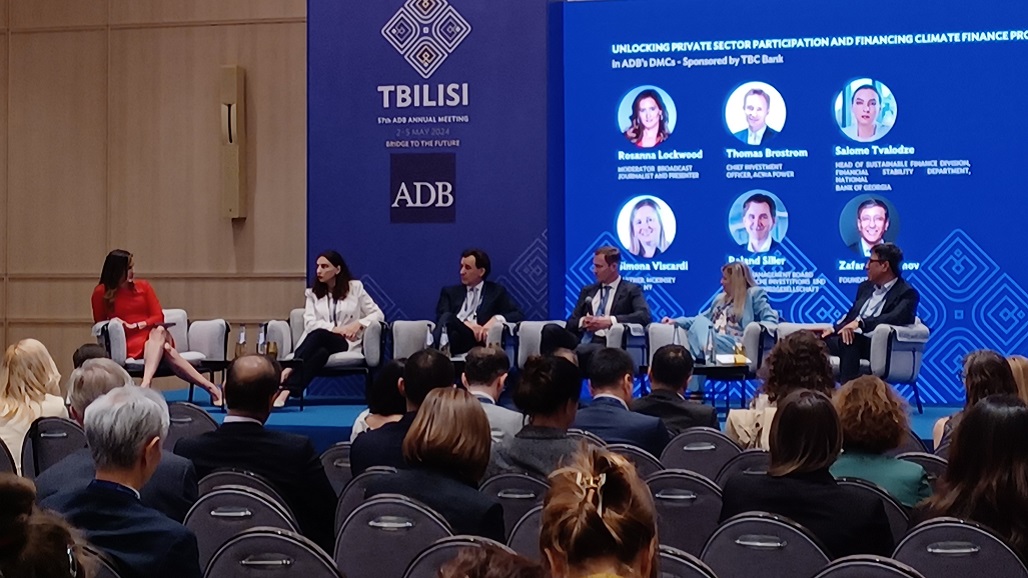
Publication Launch: A Toolkit on Promoting Gender Equality in PPP Projects
The dialogue that took place during the launch of the Toolkit explored the importance of promoting gender equality in public-private partnerships and in closing the infrastructure financing gap. Panelists shed light on how financiers, investors, and companies can help promote gender equality, leading to not just greater social impact but also enhanced economic outcomes.
Financing Greener Value Chains in the CAREC Region
This seminar brought together government officials, development partners, and private sector representatives to discuss the role of regional cooperation in strengthening Central Asia Regional Economic Cooperation’s (CAREC) linkages with global value chains while advancing the climate agenda. It explored opportunities to mobilize financing and support preparation of regional climate-related projects.
The Role of Technology in Fostering Inclusive Finance and Supporting Client Resilience
The seminar explored the evolving impact of new digital technologies on banking services. It highlighted benefits for end-users, especially vulnerable client groups, how to address the scalability challenges, and the role of partnerships to tap the potential of digital finance. The event featured insights from the perspectives of market regulation, digital finance firms, platforms, and investors, with the aim of enhancing financial accessibility while ensuring long-term resilience.
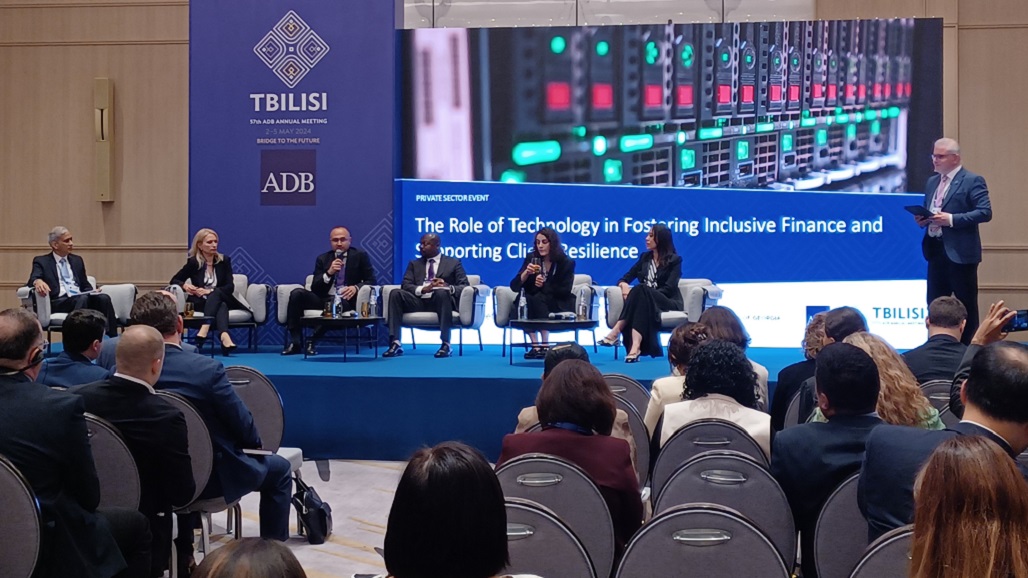
This panel showcased how Georgia’s strengths, including infrastructure and trade networks, can be leveraged to drive regional sustainable development. Speakers observed that by capitalizing on its strategic position, Georgia can foster collaboration and investment opportunities that benefit neighboring nations. They further pointed out that enhanced connectivity, streamlined trade routes, and increased investment flows can catalyze economic growth and unlock the region’s diverse potential.
The session pointed out that the path toward carbon neutrality requires managing the risks of decarbonization, and that lenders and borrowers need to understand climate risk-adjusted returns and strategies to achieve net-zero emissions. This session focused on the key role of financial supervisors and regulators, and the need to improve climate disclosure and related financial policies to promote climate finance.
The roundtable discussed microfinance industry’s efforts in Asia and the Pacific to support micro, small, and medium-sized enterprises (MSME), low-income groups, and women-led businesses, focusing on financial resilience, including climate change adaptation. It explored the progression of microfinance to specialized MSME banking, impact of digitalization in microfinance, and the competition from fintech and neo-banks.
Sustainable Procurement – Contributing to ADB’s Climate Mitigation and Adaptation Goals
The session underscored ADB’s commitmenty to adopting sustainable procurement and using its portfolio monitoring system to track progress toward ADB’s climate mitigation and adaptation goals. Panelists shared the environmental and social benefits of applying sustainable procurement in ADB operations, contributing to members aligning their systems to meet the Sustainable Development Goals.
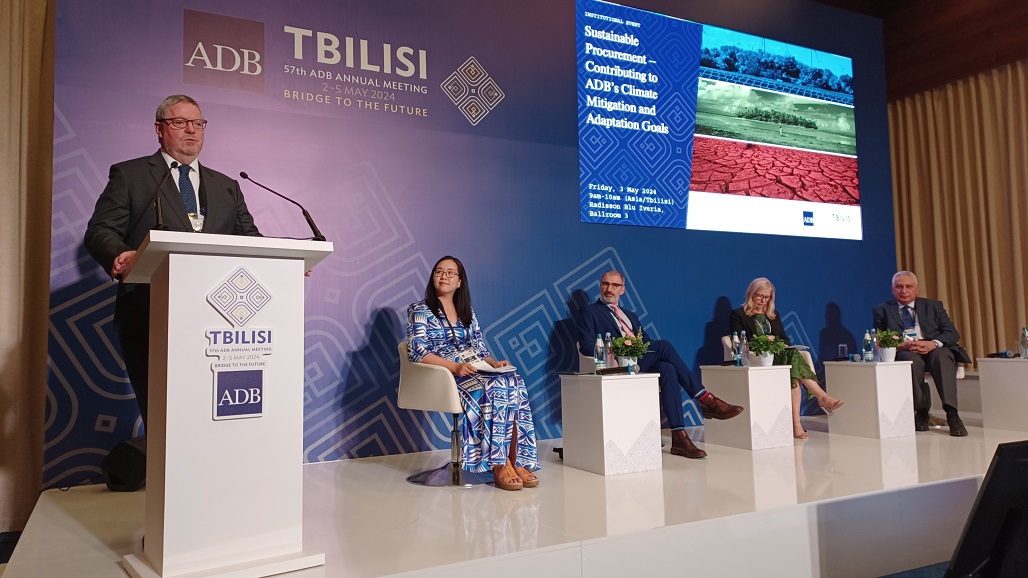
Rising Above the Heat: Forging Gender-Responsive Strategies to Extreme Heat
This session explored the escalating impacts of heat stress in Asia and the Pacific, with a particular focus on its effects on women. Experts shed light on women’s critical role in climate resilience, exploring gender responsive policies and infrastructure needed to mitigate heat stress impacts effectively.
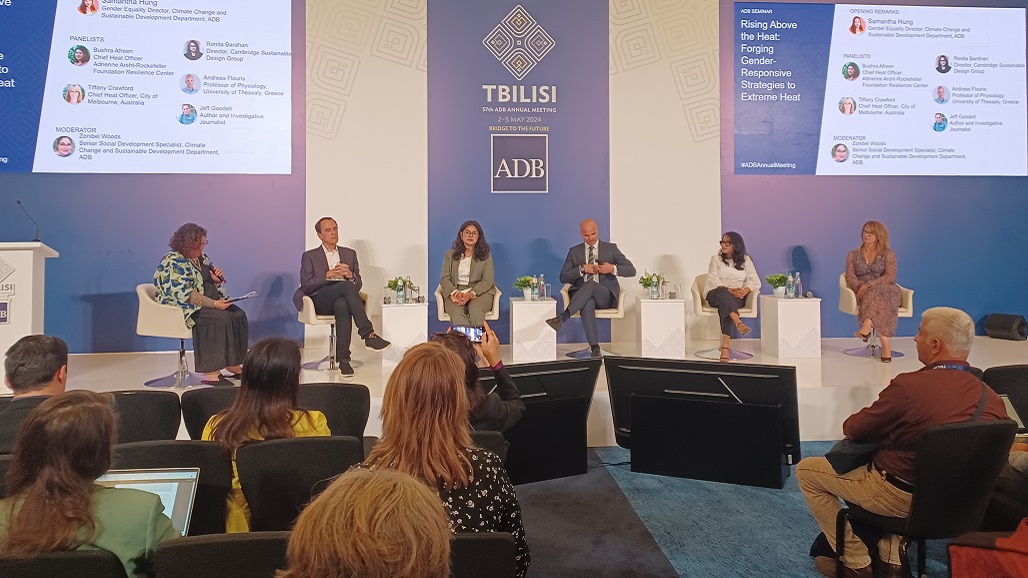
Just Energy Transition: Asserting Rights, Remedial Action, and Redress
The session presented community perspectives on how ecosystems may be affected by low-carbon, cross-border energy plans and projects financed by ADB. The Forum recommended alternative just energy transition models that would prioritize the rights of the diverse peoples of Asia and the Pacific.
Unleashing the Power of AI to Accelerate Inclusive Economic Development
The session underscored that AI is demonstrating huge potential to accelerate progress toward the Sustainable Development Goals. Experts shared a perspective on the development impact that AI can achieve across the region. In this joint panel with the Boston Consulting Group, ADB shared its vision to support developing member countries in realizing this transformative potential.
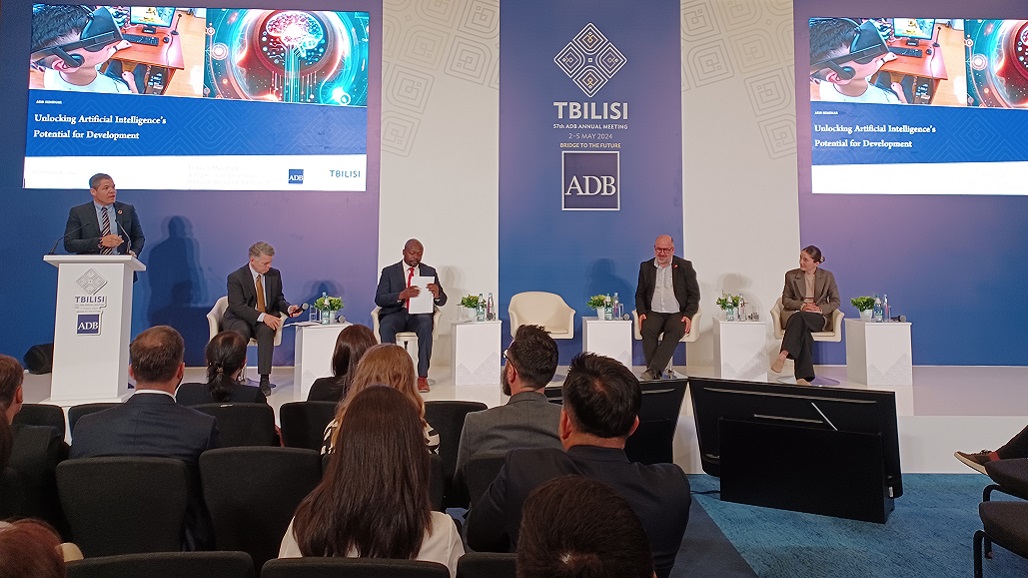
Toward Nature Positive in Asia and the Pacific
The seminar discussed ADB’s approaches for developing member countries to strengthen their nature agenda, which can contribute to delivering their international commitments on climate and biodiversity. This session covered the urgent need for policy and technical actions, including innovative finance that leverages public and development funds to catalyze private capital sources. According to the speakers, this is critical to meeting biodiversity financing needs to protect the world’s natural capital and secure ecosystem services.
The session noted that financially viable nature-based solutions (NbS) support the development of more climate-resilient and sustainable landscapes and economies, further adding that their bankability enables projects on the ground to accelerate scaling and replication, realizing large-scale positive impact on nature and communities. The session shared lessons on bankable NbS which have the ability to create positive environmental returns that lead to improved biodiversity and climate goals, while also being attractive for financial institutions to invest in.
Driving E-Mobility in Developing Asia and the Pacific
This seminar presented green transport trends in developing Asia and the Pacific, including ADB’s comprehensive approach to promoting e-mobility across all major transport forms, such as rail, metro, buses, and electric vehicles. The session gathered key actors needed for a successful transformation, including government, the private sector, scientists, and institutional investors.
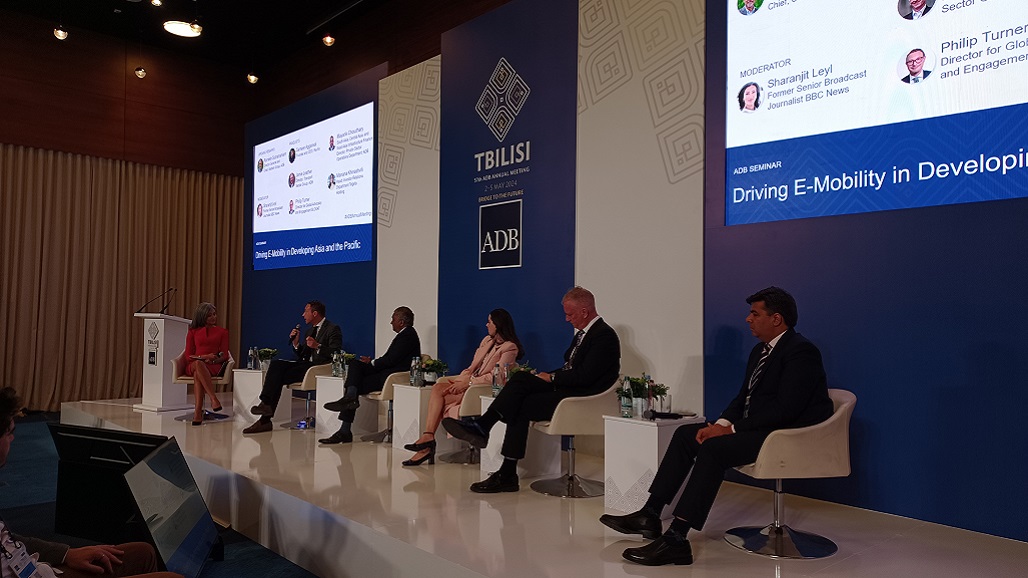
From Vision to Results: ADB’s Development Effectiveness Toward 2030
This seminar reflected on the findings of the 2023 Development Effectiveness Review to understand what ADB is doing to enhance its development impact in times of multiple, overlapping global crises and how it can leverage its multisector expertise to deliver the sustainable development outcomes envisioned in its Strategy 2030.
Unlocking Artificial Intelligence’s Potential for Development
Speakers explored the impact of AI’s rapid growth on economies and daily life in this seminar, which focused on AI’s benefits and socio-economic challenges. The session discussed strategies for leveraging AI, developing regulatory frameworks, and ADB’s support for these efforts, with insights from leading experts.
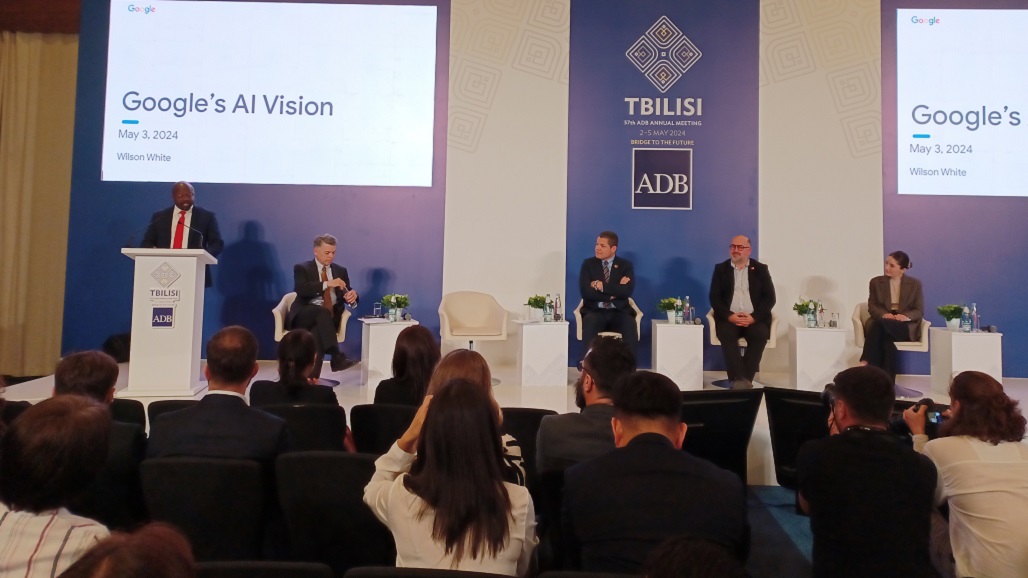
ADB’s Evolution Roadmap: Update to Strategy 2030
The session pointed out that a year after being discussed at the 2023 Annual Meeting, MDB Evolution continues to drive profound change at ADB and across the world of international development. Panelists discussed what has been achieved in the past year, and how ADB is moving forward through the Strategy 2030 midterm review and other initiatives.
The session aimed to increase public awareness of CSO reflections on ADB’s new Environmental and Social Framework and the proposed changes in the bank’s safeguards policy architecture. NGO Forum on ADB provideed recommendations for safeguards that will protect project–affected people and create a platform for them to raise their concerns on issues related to climate change, indigenous peoples, gender, and conflict-affected situations.
CEOs from the Asia and Pacific region shared their views on how to address some of the most urgent global problems such as climate change, food security, financial inclusiveness, and gender empowerment, through a more impactful private sector participation.
Financing the Clean Energy Transition in South Asia
Panelists exchanged views on accelerating clean energy development in South Asia. Discover innovative financing strategies, hear about domestic efforts, and explore the need for a dedicated regional fund to advance the transition. Share success stories and ideas for regional cooperation toward a resilient energy future.
Green City: Transforming Urban Landscapes for a Sustainable Tomorrow
The session noted that cities occupy only 3% of the earth’s land but host more than half of the world’s population, consuming 60-80% of the world’s natural resources and resulting in pollution, climate change, and overall environmental degradation, and that green cities aim to reduce their ecological footprint. The panel discussion featured speakers from international financial institutions, governments, and private businesses to explore effective strategies to enhance urban living and minimize environmental impacts.
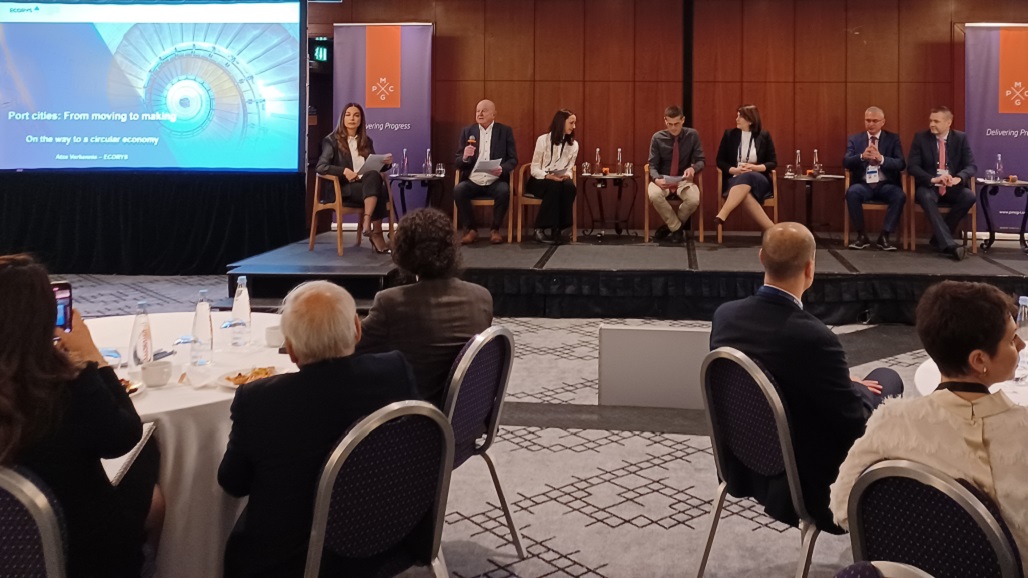
Climate and Accountability: A Future ADB Accountability Mechanism?
Panelists shared perspectives on what should the ADB Accountability Mechanism look like with the new standalone safeguard standard on climate change under its new Environmental and Social Framework.
Managing the Macro-Financial Impacts of Climate Action
The session noted that progress on climate change mitigation and adaptation continues to fall short. It pointed out that one reason is policymakers’ concern over potentially negative macro-financial effects—i.e., it could reduce growth, raise inflation, entail substantial fiscal and financial costs, and cause dislocation. Panelists discussed how climate actions could affect the economy; and outline policies to ease any negative short-run impacts.
Digital Bonds for ESG Investing and the Future of Capital Markets in Asia and the Pacific
The seminar brought together policymakers, regulators, and investors to discuss Asia-Pacific capital markets’ key trends and the role of digitalization in enabling developing countries to overcome market infrastructure gaps. It focused on the potential of digital environmental, social, and corporate governance (ESG) bonds to boost sustainable investments, the need for an enabling environment, and a roadmap to enhancing market readiness.
Heat and ICE: Investment, Climate, and Economics
The CNBC Debate highlighted the wide-ranging impacts of glacial melt, especially water stress, infrastructure damage, and economic displacement. It pointed out that as heat thresholds are crossed, experts share their perspectives on how countries can find lasting, sustainable solutions, with focus on policies, innovative climate technologies, and investments.
Achieving Climate Outcomes for Transformation
The seminar exploreed how multilateral development banks and governments can enable the transformation of the global financial system to avoid devastating climate impacts through drastic emissions reductions and enhanced resilience.
This session tackled the complex interplay between climate change and conflict in the Asia and Pacific region, with a focus on the vulnerabilities faced by women and other marginalized populations, including LGBTI communities. The session offered a dialogue among CSOs, policymakers, ADB, academia, practitioners, and representatives from youth, women, and vulnerable populations.
Future Financial Landscape Driven by AI and Fintech Innovations
This seminar addressed the impact of recent advances in AI and fintech innovations on the financial industry. The speakers noted that while this transformation can bring extensive benefits, addressing challenges is equally important. They emphasized that regulators should drive the transformation, emphasizing collaborative efforts to harmonize policies in the borderless digital world.
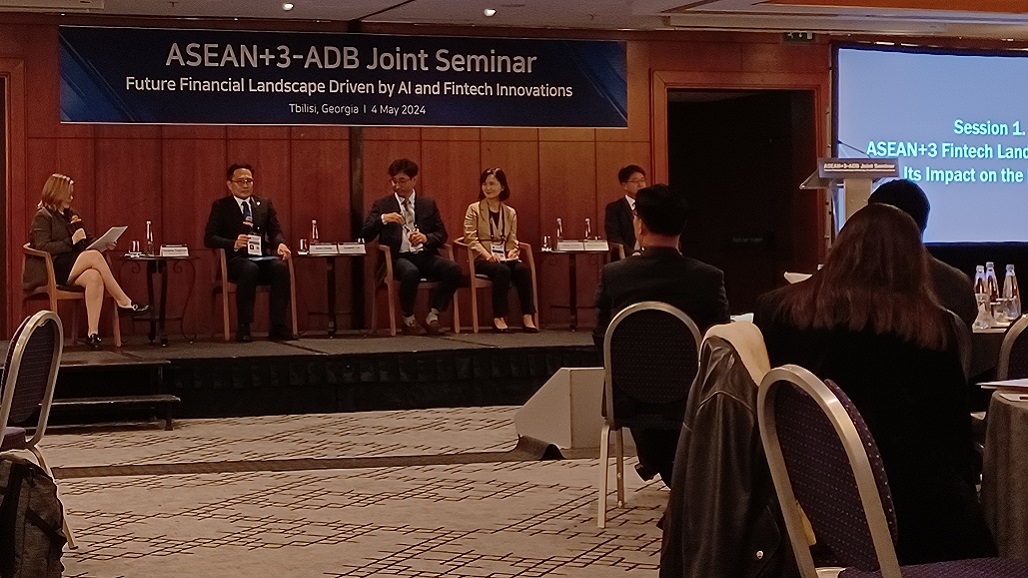
Enhancing Safeguards: From Better Policy to Better Implementation
This seminar demonstrated how environmental and social safeguards support inclusive, sustainable, and resilient development.
Led by youth advocates for disability rights, the session aimed to promote a deeper understanding of disability rights issues from an intersectional perspective, and mechanisms to increase meaningful engagement of marginalized youth groups in climate action initiatives.
ADB as a Knowledge Bridge: Bringing the Best Global Knowledge to Asia and the Pacific
This session highlighted that to successfully drive development, ADB is committed to bringing the best global knowledge to its developing member countries. Discussion focused on how sector knowledge can best be shared between ADB’s developed and developing members, and how ADB operations can enable effective exchanges, including on technologies, policy, and design.
Toward Climate-Friendly Globalization
This session noted that Asia’s success in strengthening trade and investment connections will continue to have an outsized impact on the region’s future development. However, it also highlighted that a new globalization model post-pandemic—and the sprawling network of global value chains that support it—needs to embrace climate-friendly pathways to ensure sustainable economic development. This seminar considered strategies to reduce the carbon intensity of cross-border production and trade.
Future Host Country Event (Milan 2025)
Italy will host the Asian Development Bank’s (ADB) 58th Annual Meeting on 4 to 7 May 2025. The meetings will be held in Milan, marking Italy’s first time to host and the first ADB Annual Meeting in Europe in almost a decade. The Annual Meeting theme is “Sharing Experience, Building Tomorrow”.
“The challenges of climate and development are persistent and demand our continuing efforts. Milan, as an economic powerhouse at the forefront of innovation and industry, symbolizing the spirit of progress and collaboration, is an ideal location to exchange experiences and build a better tomorrow,” said ADB President Masatsugu Asakawa. “I am certain the 2025 Annual Meeting will offer a great opportunity to advance our shared goals in the stimulating setting of Milan.”


Leave a Reply